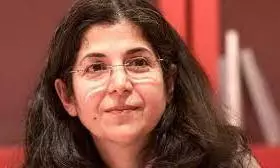
Anti-hijab movement in Iran transformed society and prisons, says freed academic
text_fieldsFariba Adelkhah, a French-Iranian academic, who spent years imprisoned in Iran before her release in February, has spoken about the transformative impact of Iran's "Woman. Life. Freedom." protest movement.
The movement began after the death of 22-year-old Mahsa Amini in Iranian custody in September 2022, sparking nationwide demonstrations against Iran's mandatory headscarf and clerical rule.
While detained in Iran, Adelkhah had the opportunity to witness the determination and resilience of female political prisoners, some of whom have played pivotal roles in the "Woman. Life. Freedom." protests. These women inmates often sang together in an act of defiance. According to Adelkhah, the movement has significantly influenced both Iranian society and the conditions inside prisons.
In Evin prison, where Adelkhah was held, people from diverse backgrounds came together through their shared commitment to the cause. This unity transcended political affiliations, and Adelkhah emphasised that it was driven by the movement itself, reported AFP.
Adelkhah's ordeal began in 2019 when she was arrested at Tehran's airport, accused of colluding with foreigners and engaging in propaganda against the Islamic Republic. She was sentenced to six years in prison but never physically abused during her detention.
She acknowledged that psychological humiliation was a constant presence, even though she was not subjected to physical violence. This aspect has been different for male prisoners, some of whom have reported physical abuse, and there have been allegations of sexual abuse of detainees in Iranian prisons, as mentioned by other rights activists.
While in prison, Adelkhah, along with another inmate, Kylie Moore-Gilbert, an Australian academic, staged a 50-day hunger strike. Both were among several Western passport holders held in Iran, which has been perceived by activists and governments as a strategy of hostage-taking.
Although many American detainees have been released, several Europeans, including four French nationals, are still believed to be held in Iran.
The "Woman. Life. Freedom." protest movement has had a profound impact within Evin prison. Female inmates defy prison authorities by going without headscarves when they are among themselves, demonstrating the movement's influence. The protests have resulted in fewer women wearing veils when men enter, a notable shift from previous practices.
Adelkhah lauded Nobel Peace Prize winner Narges Mohammadi, a 51-year-old journalist and activist who has been repeatedly jailed and imprisoned again since 2021. She described Mohammadi as someone who has turned the prison into a "space of combat, of protest par excellence." The activist has refused to wear the compulsory hijab in prison and has been subjected to additional restrictions as a result.
While the Iranian government quashed the daily protests with severe repression, the slogan "Woman. Life. Freedom." has become ingrained in Iranian culture.
According to Adelkhah, the movement has compelled the Islamic Republic to make concessions on various issues. She highlighted how like-minded Iranian women now greet each other when they go out without headscarves, a practice that was previously unimaginable.
This transformation reflects the enduring impact of the movement and the strength of its message.






















